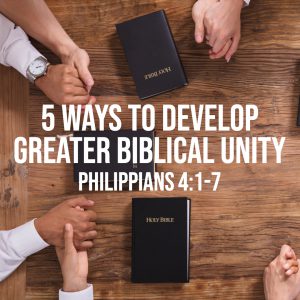Philippians 4:1-7: Five Ways to Develop Greater Biblical Unity
June 23, 2019
TODAY'S BIBLE READING:
2 Kings 20-21, Psalm 120, Luke 6:37-42, Philippians 4:1-7

Paul has given the Philippians a strong exhortation to Christian maturity and rejoicing in the Lord and continuing to strive for that which is heavenward for them in Christ Jesus. No resting on your laurels! How do you “stand firm in the Lord”? By continuing to move ahead. You can’t stand still; you’ve got to keep on growing!
But then Paul turns to what, in some ways, is the pointed edge of the application of this letter, which is a specific appeal to unity. There was clearly some division in the church at Philippi, focused on a friction point between two prominent women in the church. How did Paul work towards bringing about a greater unity? Five ways.
First, as you will remember, Paul has already laid the theological groundwork for unity. That is, he does not have to create unity. These Christians are already united in Christ! What they need to do now is realize that they are united and act more as if they actually are united.
Second, Paul is actually bold enough to call them out by name. This is a letter that would have been read in public. Can you image this point of the letter when the specific names of Euodia and Syntyche were called out? Of course, naming names in public is not something to do regularly. Normally, we should name names in public when we have something to affirm – to give credit where credit is due and to honor all those who deserve honor. But there is a time to specifically mention individuals in an exhortative way. He’s not telling them off or dishonoring them. He’s appealing to them and doing it publicly. If he did not name them in public, it would be possible that everyone in the church would feel tarred by the same brush, as if it were their fault. But now they all know where the application at this point in this letter falls.
Third, he also asks the church specifically to help these two women. Perhaps the matter was beyond them. Sometimes there can be bones of contention which grow up to such a level that it is very unclear how exactly to solve the problem. So Paul asks others to get involved too. In particular, it is possible that Paul has someone specifically in mind to provide this service. The reference to “my true companion” may be a reference to someone that was specifically asking to help and would have known by this description that he was being publicly asked.
Fourth, he returns to his theme of joy. It is hard to be angry with, or estranged from, someone that you are praying with. It is even harder to be estranged from someone that you are rejoicing with. This focus upon Jesus – the point of commonality that all true Christians have – is the key way to bring about unity. Some of it is doctrinal, as Paul has already laid out so far in the letter. But some of it is also emotional. Rejoice in the Lord!
Fifth, then Paul gives several masterly pieces of pastoral counsel, each of which could be a sermon on their own. He urges gentleness to everyone, and evident gentleness too. We all want to be treated with kindness. And we should treat everyone with gentleness, even when hard and difficult things have to be said. Why? The Lord is near. That thought – the presence of God himself – should stop harsh or bitter words of recrimination. God is near. But then he also speaks a profound work about anxiety. So much spiritual ill comes from a worried heart. How not to be anxious? Pray. When anxiety hits you, turn what is worrying you over to God in prayer. Push that burden off on him. He can carry that fear. Give it to him. If you are worrying much, you are likely to be praying little. Maybe you have some anxieties that however much you pray about them you cannot get rid of them. Ask God again for help. And don’t be afraid to ask others, pastors around you, to pray and help you too. When you do this, then the peace of God will guard your heart. This peace is above all understanding, because this peace is not based on circumstances but upon the person and nature of God, and therefore nothing and no one can take that peace from us.
ABOUT THE AUTHOR
Josh Moody (Ph.D., University of Cambridge) is the senior pastor of College Church in Wheaton, IL., president and founder of God Centered Life Ministries, and author of several books including How the Bible Can Change Your Life and John 1-12 For You.
WANT MORE?
To receive God Centered Life devotionals directly in your inbox, as well as other resources, enter your email address in the form at the bottom of this page and click "subscribe."

